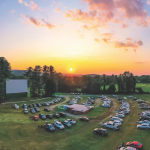This is the final installment of FOH's summer business focus on Nashville as a touring hub, and we're starting where we began, at Soundcheck, because the story of that business is a worthwhile lesson in economics, strategy and humanity.
The first profile of Soundcheck and its owner, Ben Jumper, was written in April, a few weeks before nearly 14 inches of rain over a weekend turned much of Nashville into a disaster area, including Soundcheck, which was completely inundated. The next time Jumper and I spoke, it was inside the cavernous space of the company warehouse as it underwent nearly round-the-clock renovation, replacing thousands of square feet of drywall, electrical wiring and staging. The high-pitched sound of saws, drills and sanders forced Jumper to talk a bit more loudly than usual. But considering that all 160,000 square feet of Soundcheck was rising out of its watery disaster as quickly as it was – the floods occurred on May 1 and 2, and Jumper predicted that rehearsals would start taking place by the end of July – he looked surprisingly relaxed. It might have helped that tenants were already returning to the 250 newly-rebuilt equipment lockers, storing musical instruments and touring gear. Jumper says that based on early indications, at least 40 to 50 percent of previous tenants had indicated that they would be renting space again, and he expects that number to grow as those who lost equipment in the floods get back in touch after insurance settlements have been paid out, and as he reaches out to artist/clients through their management companies. Some, like guitarist David Graff, who has toured with Reba McEntire and is currently out with Rascal Flatts as the guitar technician, remain devastated – Graff had stored 121 guitars at Soundcheck, and 100 of them were destroyed. Others got off considerably easier, like artists Vince Gill and Michael W. Smith, who had larger lockers with shelving in them that kept items above the water line. The manufactures who used Soundcheck as a hub for their Nashville sales and service operations, including Fender, Shure and Peavey, are all expected to return as the drywall goes up and delineates their spaces.
Feeling Their Pain
Jumper is genuinely empathetic with all of his clients – he estimates his own business losses at upwards of $1.2 million, far more than the $500,000 maximum coverage available through Federally sponsored flood insurance and a number that several of his clients also exceeded. For the 20 percent or so who did not maintain the flood insurance mandated by their storage contracts, any amount of loss is just as painful.
Soundcheck is being rebuilt with a combination of insurance settlements and an estimated $1 million in Federal Small Business Administration (SBA) loans costing 4 percent over 30 years. That doesn't faze Jumper, who in less than a year has resuscitated CenterStaging in Burbank, Calif., buying it out of bankruptcy, and opening Soundcheck Austin, equipped by his purchase of locally-based Musicmakers ProBackline. Each location – Nashville, Los Angeles and Austin – has its own set of venture partners, which helps distribute the capital loads, but it's plain that Jumper is the point man. Rather than ruminate over the losses he sustained, he intrinsically sees what happened as a reaffirmation of his spiritual faith and his belief in people. He mentions more than once the fact that he still has a house to go home to and a life to live, reminding the listener that 31 people died and approximately 2,500 homes in Nashville were destroyed by the flooding.
Disasters often beget changes in operations, and Jumper says some of what he's implementing will include tactics like wider use of shelving in lockers and strategies that include closer cooperation with local government agencies in developing usable early warning systems for natural disasters like this one. (Accepting the "act of God" premise for the floods is not a problem for Jumper, but he, like many others in Nashville, casts a skeptical eye on the Army Corps of Engineers, which maintains the waterway borders in the region and which has been accused of not providing sufficient notification for the opening of river and dam flood valves during and subsequent to the rains. "After Opryland flooded in 1975, the Corps said it would never happen again," Jumper says, with evident sarcasm, adding that during this year's flooding, the Corps issued numerous estimates of river crest levels, most of which were wrong and too late to be of much use.) He's not planning on adding automated moisture monitoring for the warehouse's floors, but he does have an 80-foot-by-30-foot water- and tornado-proof concrete vault, now in the engineering stages, planned for. It will offer its own set of lockers for particularly expensive or rare musical instruments.
A Freak Occurrence
In fact, there's relatively little in the way of new initiatives planned for Soundcheck 2.0, in large part because of the widely held belief that what happened that first weekend in May was truly a freak occurrence. Anyone who had watched the radar screens and saw how the storms stayed within an extraordinarily narrow band as they moved like an unstoppable freight train through Nashville could easily concur. They looked eerily intentional, as opposed to the drunken randomness of the tornados that are also part of the meteorological landscape of the South every spring. The floods are widely deemed as "100-year" phenomenon, an engineering term denoting probability, but others, including Jumper, casually refer to it as a "500-year flood," and besides, the limits on Federal flood insurance don't look like they'll be adjusted upward anytime soon. This kind of optimism – "If we've survived this, we can survive anything" – is absolutely necessary for just about any business or person to pick up and move forward.
Besides, Jumper thinks he already has the best survival proposition he can, in the form of his employees. "The staff here was already planning out our exit strategy as the waters were rising," he says, referring to how to methodically move equipment and instruments out of the muck to the four rental warehouses around town that would house the triage operations that would decide what could still work, what could be repaired and what would need to be thrown out. It was that kind of organizational competence that helped attract amplifier and guitar technicians who, once there was no more room for additional volunteers at Soundcheck, would start online forums and blogs like the one run by Tour Supply, which coached victims on how to bake drenched amplifier transformers.
Averting Chaos
"The music community came together here and kept chaos from happening, and the larger community of Nashville did the same," says Jumper who, in a very un-Red-State tone, credited several city and state officials for helping Nashville business get through the worst of it, most notably Nashville mayor Karl Dean.
In fact, as devastating as the floods were, they also underscored why Nashville, at a time of such volatility and uncertainty in the music industry, remains the touring capital of the world: the place just works, because of the people there. Jumper says amplifiers, guitars, speakers, consoles and everything else is just pouring in from the outside. But the actual rebuilding is taking place from within. "Nobody here called out for anyone to save them," he says. They helped themselves, and when they saw they were going to be alright, they went and helped someone else. That's Nashville."



